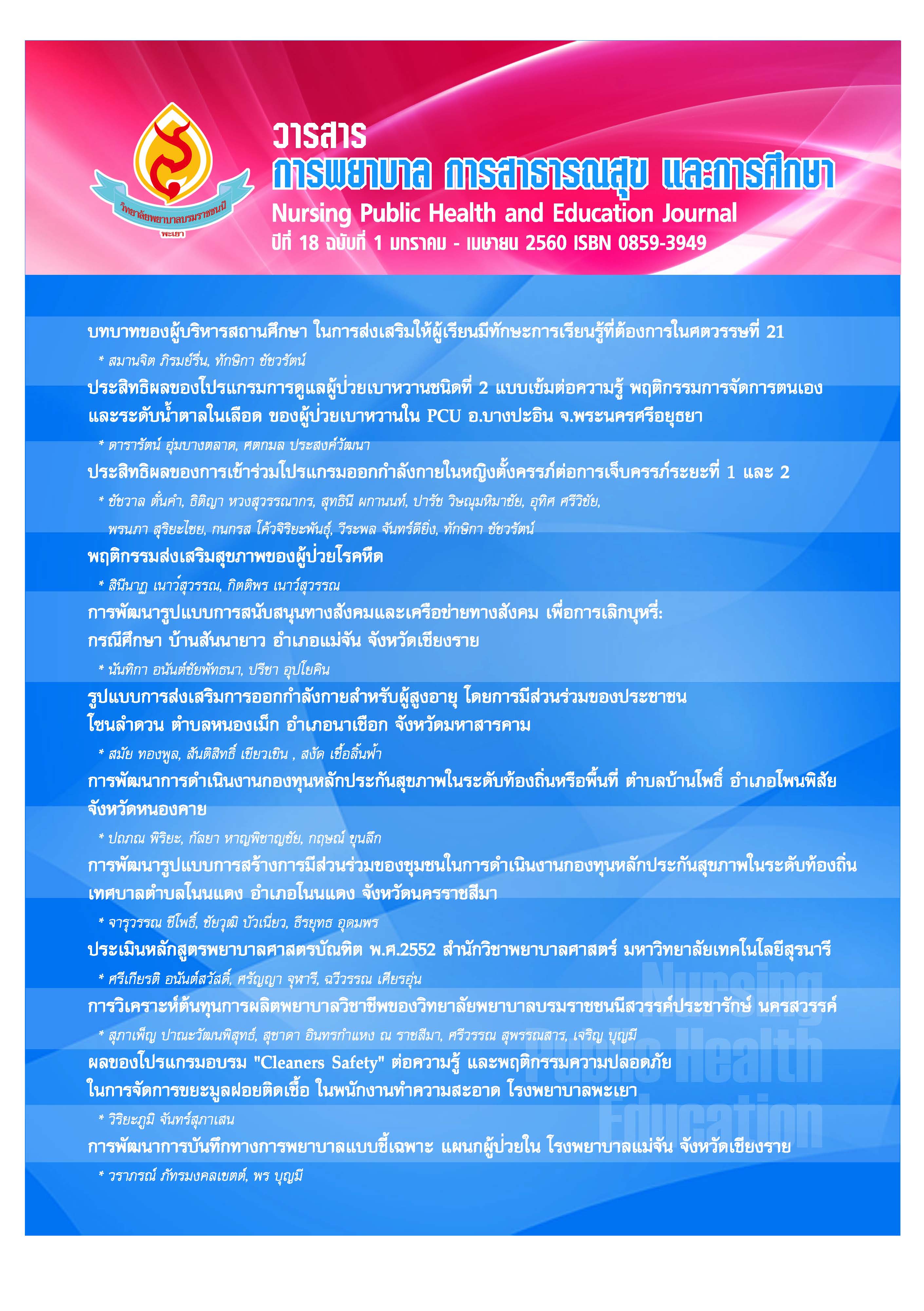ประสิทธิผลของโปรแกรมการดูแลผู้ป่วยเบาหวานชนิดที่ 2 แบบเข้ม ต่อความรู้ พฤติกรรมการจัดการตนเอง และระดับน้ำตาลในเลือด ของผู้ป่วยเบาหวานใน PCU อ.บางปะอิน จ.พระนครศรีอยุธยา
คำสำคัญ:
ผู้ป่วยเบาหวานชนิดที่ 2 พฤติกรรมการจัดการตนเอง, น้ำตาลในเลือด, patients with type II diabetes, self-management behavior, blood glucoseบทคัดย่อ
การวิจัยครั้งนี้เป็นการวิจัยกึ่งทดลอง (quasi-experimental research) แบบกลุ่มเดียววัดผลก่อนและหลังการทดลอง วัตถุประสงค์เพื่อศึกษาประสิทธิผลของโปรแกรมการดูแลผู้ป่วยเบาหวาน ชนิดที่ 2 แบบเข้ม ต่อความรู้ พฤติกรรมการจัดการตนเอง และระดับน้ำตาลในเลือด ของผู้ป่วยเบาหวานใน PCU อ.บางปะอิน จ.พระนครศรีอยุธยา กลุ่มตัวอย่าง คือ ผู้ป่วยเบาหวานชนิดที่ 2 ที่ขึ้นทะเบียนใหม่ในปี 2558 จาก PCU 4 แห่ง คัดเลือกแบบเฉพาะเจาะจง จำนวน 34 ราย เครื่องมือการวิจัยมี 2 ส่วน ส่วนที่ 1 เครื่องมือในการรวบรวมข้อมูล ประกอบด้วย แบบสอบถามข้อมูลส่วนบุคคล แบบประเมิน ความรู้ พฤติกรรมการจัดการตนเอง และความพึงพอใจต่อโปรแกรมที่ได้รับ ส่วนที่ 2 เครื่องมือที่ใช้ในการวิจัย ประกอบด้วย 1) โปรแกรมการดูแลผู้ป่วยเบาหวาน ชนิดที่ 2 แบบเข้ม ซึ่งโปรแกรมแบบเข้มนี้ผู้วิจัย ได้พัฒนาจากแนวคิดการจัดการตนเองและทฤษฎีการเสริมสร้างสมรรถนะแห่งตน ที่มีกิจกรรมการดูแลและให้ผู้ป่วยได้ฝึกทักษะด้วยตนเองมากกว่าการดูแลตามปกติจากทีมสหสาขาวิชาชีพ 1 เดือน/ครั้ง เป็นเวลา 6 เดือน และติดตามเยี่ยมบ้าน/เยี่ยมทางโทรศัพท์ทุก 2 สัปดาห์ เป็นเวลา 3 เดือน 2) สมุดบันทึกพฤติกรรมการจัดการโรคเบาหวานด้วยตนเอง 3) คู่มือให้ความรู้ วิเคราะห์ข้อมูลด้วยสถิติ ความถี่ ร้อยละ ค่าเฉลี่ย ส่วนเบี่ยงเบนมาตรฐาน และ Paired t-test
ผลการวิจัยพบว่าหลังให้โปรแกรมกลุ่มตัวอย่างมีค่าเฉลี่ยคะแนนความรู้ และค่าเฉลี่ยคะแนนพฤติกรรมการจัดการตนเองสูงกว่าก่อนให้โปรแกรมอย่างมีนัยสำคัญทางสถิติ (p<.001และ p<.001) และมีค่าเฉลี่ยระดับน้ำตาลในเลือด (HbA1c) ต่ำกว่าก่อนให้โปรแกรมอย่างมีนัยสำคัญทางสถิติ (p<.001) ผลการศึกษาแสดงว่าโปรแกรมนี้ช่วยส่งเสริมให้ผู้ป่วยเบาหวานมีความรู้และพฤติกรรมการจัดการโรคเบาหวานด้วยตนเองดีขึ้น และลดระดับน้ำตาลในเลือด (HbA1c) ได้ จึงควรนำไปประยุกต์ใช้ในหน่วยบริการปฐมภูมิในเครือข่ายต่อไป
Effectiveness of intensive care program for patients with type II diabetes on knowledge, self-management behavior and blood glucose levels of diabetic patients in the PCU, Bang Pa-In District, Pra Nakhon Si Ayutthaya Province
This research was a quasi-experimental research and investigated a group which was evaluated before and after the experiment. The objective was to study the effectiveness of intensive care programs for patients with type II diabetes on knowledge, self-management behavior and blood sugar levels of diabetic patients in the PCU, Bang Pa-In District, and Ayutthaya Province. The sampling population was made up from patients with type II diabetes who were registered in the year 2015 from 4 areas of PCU. The 34 sampling populations were selected using the purposive sampling technique. The research tools consisted of two parts, the first tool was to gather information which consisted of a questionnaire determining personal information, evaluation of knowledge, self-management behavior and satisfaction with the program. The second part consisted of tools used in the research as follows: 1) Intensive care program for patients with type II diabetes which was developed by the researcher and used the concept of self-management and theory of self-enhancing efficacy. There were activities associated with caring to allow patients to gain self-practice skills rather than the usual method of care. This was carried out by a multidisciplinary team, one per month for a total duration of six months, and home visits or follow-up telephone calls every two weeks for a total duration of three months. 2) The diary record for self-management behavior of diabetes. 3) The handbook of diabetic knowledge. The collected data was analyzed by statistical analysis looking at frequency, percentage, mean, standard deviation and Paired t-test.
The results showed that after the program, the average score for diabetic knowledge and self-management behavior was significantly higher than before receiving the program (p <.001 and p <.001). In addition, average blood glucose levels (HbA1c) were significantly lower than before receiving the program at a statistically significant (p <.001). The results of this study showed that the intensive care for type II diabetes program was effective in promoting diabetic knowledge, self-management behavior, and blood glucose levels. This program could be applied to the network of a primary care unit.



